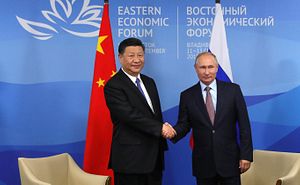On September 11, Chinese President Xi Jinping arrived in Vladivostok in Russia’s Far East to meet with Russia President Vladimir Putin and attend the Eastern Economic Forum (EEF). As Charlotte Gao noted earlier for The Diplomat, this is the third time Xi and Puin have met so far in 2018, and the first time Xi has attended the annual EEF.
That last point deserves more consideration. According to Li Hui, China’s ambassador to Russia, “At present, China-Russia relations are at their best in history… the two heads of state attending significant events held by each other are important manifestations of the high-level bilateral relations.” Yes, indeed – which is why it’s so odd that this year marks the first time Xi has made the two-and-a-half hour flight to attend one of Putin’s pet events.
The EEF was first held in 2015, part of Moscow’s push to revitalize Russia-Asia ties amid souring relations with the West. Since then, it has attracted heads of state from around the East Asian region – with China being a rather glaring exception. Japanese Prime Minister Shinzo Abe holds the record, having attended three years in a row, starting in 2016. Former South Korean President Park Geun-hye attended in 2016; her successor Moon Jae-in did so last year. Moon is not attending this year, likely because Seoul’s attention is focused on the upcoming third summit with North Korea’s Kim Jong Un (who, incidentally, is rumored every year to be possibly attending the EEF). Instead, South Korea will be represented by Prime Minister Lee Nak-yeon. Mongolian President Khaltmaagiin Battulga is also in attendance this year, and took part in 2017 as well.
By stark contrast, China – despite its “best in history” relationship with Russia – had previously been represented by low-level foreign ministry officials and business leaders. Last year, India, North Korea, and Vietnam all sent ministers to the EEF; even the United States had a notable representative in the form of California state Governor Jerry Brown. China sent only a number of business leaders and the “head of diplomatic corps” – the same level of representation as Argentina, Brunei, and South Africa.
Ambassador Li called Xi’s presence at the EEF this year “a major milestone in the history of China-Russia relations in the new era.” So why is this “milestone” happening now?
As Charlotte Gao noted, the worsening U.S.-China relationship seems the most likely explanation. As the Trump administration continues to up the ante on its trade war, with the president recently threatening to place tariffs on all Chinese exports to the United States, Beijing is moving to further solidify its already-close partnership with Russia. Notably, on the same day as Xi arrived in Vladivostok, Russia’s Vostok 2018 military drills kicked off, with China taking part in Russia’s annual strategic exercises for the first time.
Of particular importance is cooperation on the economic front, as a signal to the United States and the world. Even with bilateral trade up by roughly 25 percent so far this year, Russia cannot come close to replacing the United States as a major trade partner for China. Sino-Russian trade has yet to cross the $100 billion mark in a year, compared to over $630 billion in China-U.S. trade last year. Still, Russia can serve as one source for replacing U.S. agricultural imports, which are now under retaliatory Chinese tariffs. More broadly, attending the EEF gives Xi another platform from which to attack the U.S. trade war, and pledge to defend rules-based trade – all while lending legitimacy to a key foreign policy initiative of Putin’s.
Putin noted in a press conference after his meeting with Xi that “we paid special attention to trade and economic cooperation.” He emphasized China-Russia energy cooperation, although there were no new announcements made on this front.
Xi, on his part, noted that strengthening China-Russia cooperation would help the two defuse “external risks and challenges.” “We have similar or identical positions on international matters,” Xi said, and promised to “step up our coordination at multilateral venues, such as the UN, SCO, and BRICS.
Xi also highlighted the importance of local government cooperation, a point of emphasis at the meeting overall, in advancing China-Russia ties. One takeaway from the EEF so far has been the set-up of a Business Council linking Russia’s Far East and Baikal Region with China’s northeast.
The two sides also signed a handful of other agreements “on consolidating Russian-Chinese regional, production and investment cooperation in the Far East” and outlined a program for developing bilateral “trade, economic, and investment cooperation” in Russia’s Far East for the next six years.

































